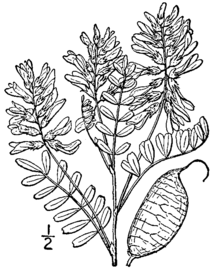Astragalus neglectus
| Astragalus neglectus | |
|---|---|

| |
| Scientific classification | |
| Kingdom: | Plantae |
| Clade: | Tracheophytes |
| Clade: | Angiosperms |
| Clade: | Eudicots |
| Clade: | Rosids |
| Order: | Fabales |
| Family: | Fabaceae |
| Subfamily: | Faboideae |
| Genus: | Astragalus |
| Species: | A. neglectus
|
| Binomial name | |
| Astragalus neglectus | |
| Synonyms | |
| |
Astragalus neglectus, or Cooper's milkvetch, is a species of flowering plant in the family Fabaceae native to northeastern North America.
Description
[edit]Astragalus neglectus is a perennial, herbaceous plant growing 30 to 90 cm tall.[2] The alternate, compound leaves have 11-25 leaflets.[3] The 10 to 20 white or creamy flowers form a cluster arising from the upper leaf axils.[3] The fruit is in the form of an inflated pod.[3]
Etymology
[edit]The first published description of the species (as Phaca neglecta) was in A Flora of North America by John Torrey and Asa Gray in 1838.[4] The species is called Cooper's milkvetch after a William Cooper who discovered the plant described by Gray in 1856 as Astragalus cooperi (which ultimately was considered to be the same entity as A. neglectus).[5]
Distribution and habitat
[edit]The range of Astragalus negelctus is centred around the Great Lakes,[3] but it also occurs from Manitoba and South Dakota east to Massachusetts and Virginia.[6] It is rare throughout most of its range.[3] It is found in wet to dry, open, often rocky habitats, especially those that are calcareous.[7] Natural disturbance is required to maintain these open habitats.[2]
Conservation
[edit]Although ranked globally as apparently secure (G4), this species is considered to be a rare and potentially vulnerable species within most of the states and provinces it occurs.[1] It is classified as endangered in Wisconsin.[8] It was formerly considered to be at risk in Minnesota, but it was delisted after the discovery of numerous new populations in the 1990s.[3]
References
[edit]- ^ a b "Astragalus neglectus". NatureServe Explorer. NatureServe. Retrieved 2020-02-11.
- ^ a b "Astragalus neglectus". Michigan Natural Features Inventory. Michigan State University. Retrieved 11 February 2020.
- ^ a b c d e f "Astragalus neglectus". Minnesota Wildflowers. Retrieved 11 February 2020.
- ^ "Astragalus neglectus". Plants of the World Online. Royal Botanic Gardens, Kew. Retrieved 11 February 2020.
- ^ Gray, Asa (1856). Manual of Botany of the Northern United States. New York: George P. Putnam and co. p. 98.
- ^ USDA, NRCS (n.d.). "Astragalus neglectus". The PLANTS Database (plants.usda.gov). Greensboro, North Carolina: National Plant Data Team. Retrieved 11 February 2020.
- ^ Reznicek, A. A.; Voss, E. G.; Walters, B. S., eds. (February 2011). "Astragalus neglectus". Michigan Flora Online. University of Michigan Herbarium. Retrieved 11 February 2020.
- ^ "Cooper's Milkvetch". Wisconsin's Endangered Resources. Wisconsin Department of Natural Resources. Retrieved 11 February 2020.



